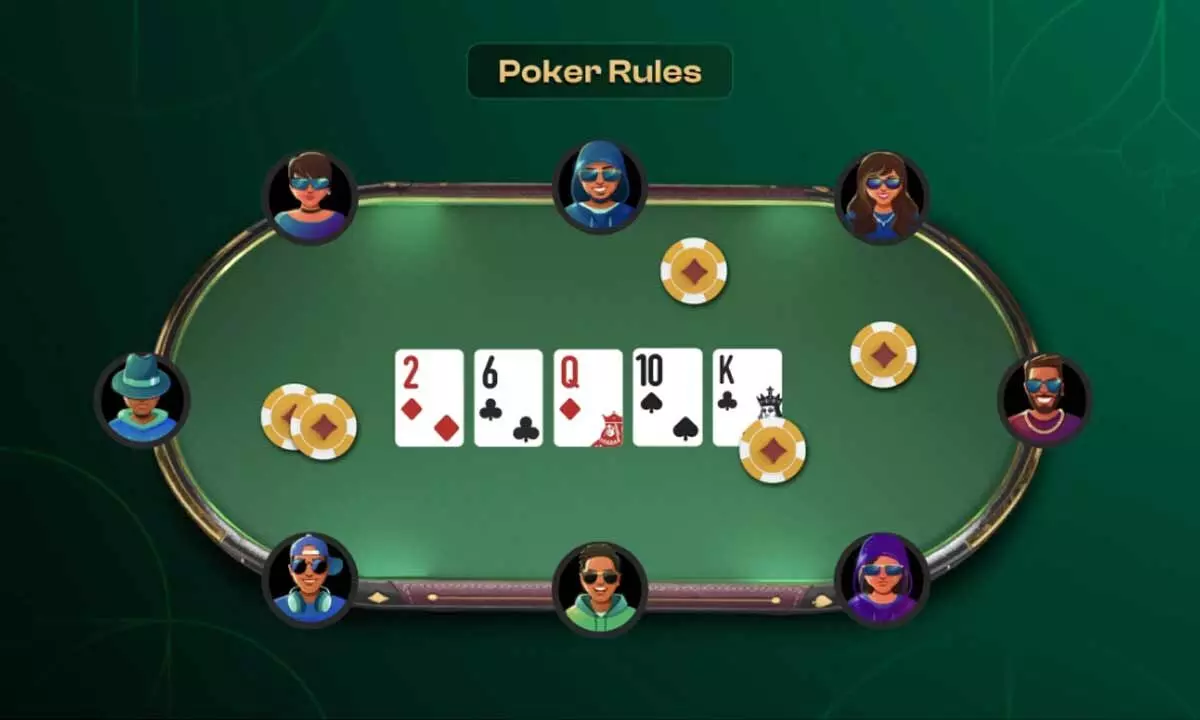Live
- Minister discusses ‘loan for capital’ with Hudco CMD
- BJP highly respects Ambedkar: Purandeswari
- Sensex, Nifty edge down in sluggish trading
- All-round development of CM native village on anvil
- Economy gets into recovery mode after Q2 slowdown
- Fieo charts strategy to push exports to US
- AP to receive rains today and tomorrow amid severe low pressure
- Job scam: No High Court bail for Partha
- Joint teams from AP, TG destroy illicit liquor
- Refusing medical aid to sexual, acid attack survivors an offence
Just In
The Psychology of Risk: Understanding Player Behavior in Online Poker


Being a good poker player is not just about skill and understanding of the poker rules. Understanding the opponent's psychology and behaviour is just as vital.
Being a good poker player is not just about skill and understanding of the poker rules. Understanding the opponent's psychology and behaviour is just as vital. But then, mastering both these aspects is easier said than done. This is why poker is one of the most strategic, intriguing, and popular games in offline and online formats.
The Understanding You Must Have
Probably because of its North American popularity, poker is a heavily studied and researched game. Books like David Sklansky's ‘The Theory of Poker’ are examples of the in-depth study done around poker rules and strategies.
As such, any avid poker player would be well-versed with the qualities that are required to become successful and they put their best foot forward while facing an opponent. We have observed that most successful players have these things in common.
● A good poker player will have a clear strategy and the discipline to stick to it at all times. This will protect the player from making wrong decisions during gameplay.
● An astute poker player would be a very patient person. They can think more logically and end up making better decisions.
● They can also think on their feet and improvise their gameplay.
● Successful poker players are adept at handling pressure. They can keep their cool even in stressful situations. and come out of it successfully.
Add a little cynicism - Poker pros always assume that the opponent has all the winning qualities that need to be overcome. If you are setting up a trap to win your hand, you must consider that the opponent has sensed it or is about to. While trying to understand player behaviour in online poker, you must assume they have good memorisation and analytical skills and can assess risks expertly.
Getting Under the Opponent's Skin
The key to poker success is outsmarting opponents by reading their game. This involves studying the player’s reactions and betting patterns. Body language is also important in offline poker, but there is no scope for it in the online format.
Bluffing - Players must be good at bluffing and also reading bluffs. Then there are semi-bluffs too, where others fold to avoid risk, or the player ends up strengthening their hand on future picks. Calling a bluff successfully is not a 100% guarantee. However, your reading of the betting patterns can help you spot a bluff and take the right action thereafter. If your poker app provides hand history, you can examine how the player bluffs and understands the thought process. But then, that’s hindsight.
The Dark Art - An extension of bluffing is the use of mind games to pressurise an opponent. While playing, you must be cautious and observant enough to notice how the opponent is putting strategic bets, raising them and/or bluffing at times. A good observer of player behaviour would deflect the opponent’s often gradual attempt to put them in an uncomfortable situation where they end up making mistakes.
How to Not Get Played
There is no one-size-fits-all when it comes to poker opponents. To mitigate the risks of poker, you must be alert enough not to be dissuaded by different personality types. Every person is unique, but some of the personalities typically present in a poker table that you should watch out for are -
The Slowburner - Some players stall the gameplay with delays. This may be due to indecision or an attempt to irritate opponents. Expert poker players will use such delays to ponder the possibilities of the delay or review the game played thus far.
The Fast Talker - Poker tables are often frequented by players who are proverbial motormouths. They can’t stop talking or chatting on online platforms, much to everyone else’s irritation.
The Showboat - A more intimidating type of the motormouth are the players who love to show off. If they win a hand, they make sure that the other players feel the defeat. They do so by showing off, often through texts in online poker. It is best to have a thick enough skin so that hands conceded to Mr Show-off are taken on the chin, with lessons learnt to go.
The Frenemy - The last person you should take advice from is a fellow opponent. Yet, there are poker players who double up as free mentors, filling your ears with what you should do and what you are doing wrong.
While these might be genuine personality traits, it is worth remembering that any type of imposing personality can affect the subconscious of the other poker players. Or worse, it could be the player’s attempt to do so.
Outthink to Excel
The grasp of poker rules is only the tip of the iceberg if you aim to be successful. Poker often becomes a lesson in psychology, given the attention required to be given to human behaviour and psychological strategies. A player can be successful only by harnessing most of the qualities and implementing them through skills and strategies.

© 2024 Hyderabad Media House Limited/The Hans India. All rights reserved. Powered by hocalwire.com






